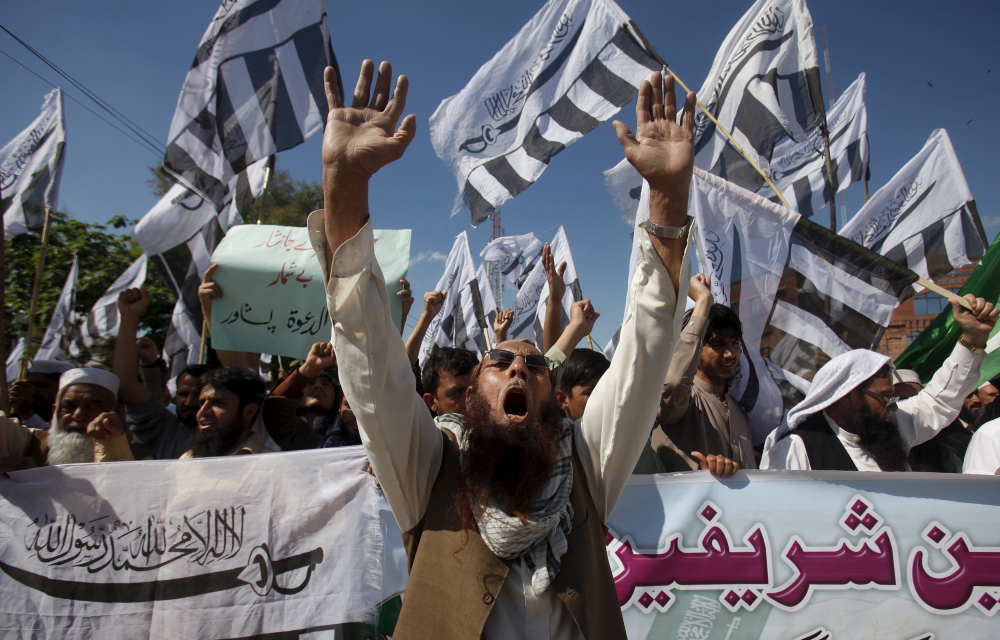RIYADH, Saudi Arabia — In the two weeks since Saudi Arabia launched a bombing campaign in Yemen, the kingdom has barely slowed the advance of Shiite rebels who appear to be digging in for a long fight.
But so far, Saudi commanders have projected no outward signs of concern that the campaign is falling short.
“We should not be impatient for the results,” Brig. Gen. Ahmad Asseri, the spokesman for the Saudi-led coalition, cautioned on Friday.
Saudi Arabia’s determination is rooted in something deeper than overcoming insecurity on its borders and the fear that rival Iran could take advantage of it through perceived links to the insurgents. Saudi Arabia’s leaders –backed by its powerful Islamic religious establishment – also have taken on a special role as guardian of both its southern neighbor and the wider Arabian Peninsula.
“This is a blessing … but it also places a responsibility on all of us,” King Salman told a gathering of the nation’s political and armed forces elite at his Riyadh palace last week.
This was more than just a rallying call by the monarch, a former defense minister who took the throne in January. It also reflected entrenched Saudi views on Yemen, shaped over decades of intervention, insurrection, tribal politics and intrigue. It also reflected a growing military assertiveness by Saudi authorities, who have received a crucial stamp of approval from the influential Sunni religious leadership that gives the royal family legitimacy to rule over the land of Islam’s holiest sites.
In Saudi calculations, the potential costs of the Yemen intervention are overshadowed by the historical imperative of keeping Yemen under Saudi wings, experts say.
“Saudi Arabia sees itself as the big brother of Yemen,” said Ali al-Ahmed, director of the Washington-based Institute of Gulf Affairs, which is often critical of Saudi policies. “That – more than Iran, more than trying to reinstate Yemen’s Saudi-friendly president – is at the heart of the decision to launch attacks. If Saudi leaders are not calling the shots in Yemen, they get very nervous.”
And probably at no time since the founding of the modern Saudi state more than 80 years ago has the kingdom been less in control of affairs in Yemen.
Yemen has splintered into a patchwork of fiefdoms dominated by forces hostile to Western-allied Saudi Arabia but which are also fighting each other. These include a powerful branch of al-Qaida, groups claiming loyalty to the Islamic State and the Shiite rebels known as Houthis, who control the capital, Sanaa, and seek to gain full hold over the second-largest city, Aden.
The immediate goal of the Saudi-led attacks is to restore Yemen’s president, Abed Rabbo Mansour Hadi, who escaped to Saudi Arabia as rebels closed in on his compound in Aden last week. But Saudi Arabia and its Sunni Arab partners also have made clear that longer-term objectives are in motion.
That was reinforced last Sunday with a decision by the Arab League to form a joint rapid-reaction military force to respond to regional crises.
The stirrings of expanded Arab military resolve already have been on display. Nations including the United Arab Emirates and Jordan have joined U.S.-led airstrikes against the Islamic State in Iraq and Syria. In February, Egyptian warplanes targeted suspected Islamic State cells in Libya.
Nor has Saudi Arabia been idle. The kingdom has been a critical financier for Syrian rebels seeking to topple the Iranian-backed government of Bashar Assad.
Yemen, however, presents a new slate, experts say. It could become a test ground for a sustained Saudi-directed offensive that reaches beyond the current Houthi showdown and takes aim at al-Qaida and others – possibly even eclipsing the Pentagon’s strategy of drone strikes by bringing in greater firepower and ground forces.
Send questions/comments to the editors.



Success. Please wait for the page to reload. If the page does not reload within 5 seconds, please refresh the page.
Enter your email and password to access comments.
Hi, to comment on stories you must . This profile is in addition to your subscription and website login.
Already have a commenting profile? .
Invalid username/password.
Please check your email to confirm and complete your registration.
Only subscribers are eligible to post comments. Please subscribe or login first for digital access. Here’s why.
Use the form below to reset your password. When you've submitted your account email, we will send an email with a reset code.